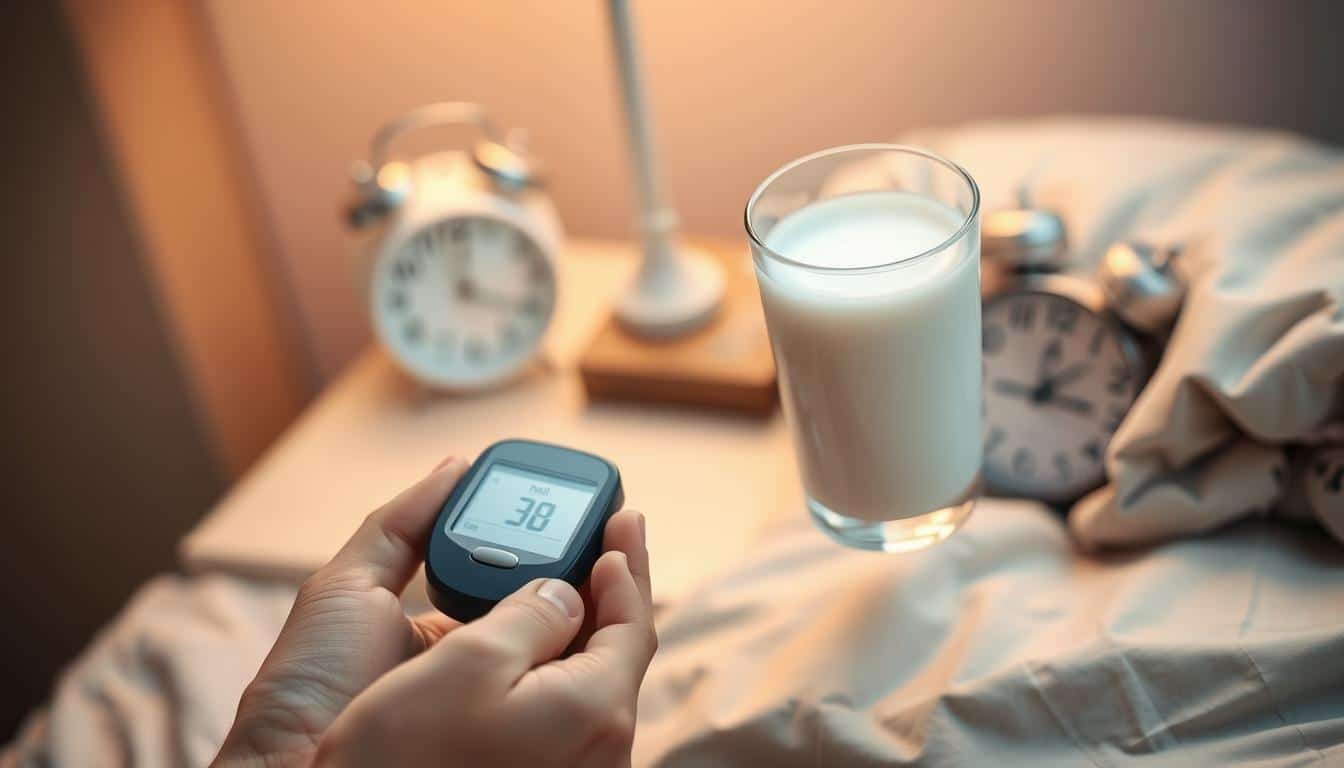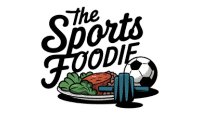You’ve just finished a tough workout at 9 PM. Your stomach growls as you debate grabbing a snack. Sound familiar? A client once told me they felt guilty eating yogurt before bed, despite feeling hungry. Their tracker showed restless nights after evening meals, but they weren’t sure why.
New research reveals surprising truths about fueling near bedtime. WHOOP data shows people eating within two hours of sleep lose 26 minutes of rest and 3% less REM sleep. Yet other studies suggest smart food choices might actually support your body’s repair cycle.
We’ll break down why your 10 PM snack matters more than you realize. You’ll see real examples of how different foods affect sleep depth and next-day energy. Discover how your system processes nutrients differently after dark compared to daytime meals.
This isn’t about strict rules – it’s about understanding your unique rhythm. Whether you’re an athlete or weekend warrior, you’ll learn to make evening food choices that work with your biology, not against it.
Understanding Late Night Eating and Its Impact on Recovery
Your evening snack choice might be affecting more than just hunger levels. Let’s explore how timing and biology interact during those final hours before sleep.

What Counts as Evening Fuel?
Evening fuel refers to meals or snacks consumed within three hours of sleep. This window matters because your body’s processing power shifts as bedtime approaches. Research shows insulin sensitivity drops by up to 50% after sunset compared to morning levels.
Your Internal Processing Schedule
Your system handles nutrients differently after dark. Here’s what changes when you eat near bedtime:
| Metabolic Factor | Daytime (10 AM) | Evening (10 PM) |
|---|---|---|
| Insulin Sensitivity | Peak efficiency | Reduced by 34% |
| Digestion Speed | 2-3 hours | 4-5 hours |
| Calorie Use | 65% energy burn | 42% energy burn |
This shift explains why late meals often lead to next-day fatigue. Your circadian rhythm directs energy toward cellular repair during sleep, not digestion. Choosing lighter options helps your system focus on recovery instead of processing food.
Potential Benefits of a Light Bedtime Snack
Ever feel that gnawing hunger just as you’re winding down? Strategic snacking before bed could actually boost your body’s repair mode. The key lies in choosing foods that work with your natural rhythms rather than against them.

Stabilizing Blood Sugar and Hunger Control
A small, balanced snack helps maintain steady blood sugar levels during sleep. This prevents sudden drops that trigger wakefulness – especially crucial for those managing diabetes. Studies show 68% of people with blood sugar concerns sleep better with a protein-rich bedtime bite.
Certain foods contain natural sleep supporters. Tart cherry juice packs melatonin, while kiwi offers serotonin precursors. These nutrients help you fall asleep 20% faster according to sleep research. Pair them with complex carbs for lasting energy.
Timing matters most. Aim to eat 60-90 minutes before bed to avoid digestion interfering with sleep cycles. Try these combos:
- Almond butter + whole grain crackers
- Greek yogurt + berries
- Cottage cheese + pineapple
For active individuals, a light snack prevents midnight hunger that disrupts deep sleep phases. It’s about finding your personal threshold – enough to satisfy, but not overload your system.
How “late night eating ruins recovery” for Some Individuals
That midnight snack might be costing you more than you think. Data from 12,000 WHOOP users reveals clear patterns between evening meals and next-day performance. Let’s examine three key areas where timing affects your body’s repair processes.
The Sleep-Digestion Connection
Your body prioritizes either digestion or recovery – not both. When you eat within 90 minutes of bed:
| Metric | Impact | Data |
|---|---|---|
| Total Sleep | 26 minutes lost | 7% reduction |
| REM Sleep | 3% decrease | Mental recovery affected |
| Next-Day Energy | 10% drop | Measured by HRV |
This occurs because your gut works overtime when it should be resting. Digestive stress keeps your nervous system active, blocking deep sleep phases crucial for tissue repair.
Heartburn Triggers After Dark
Lying flat after meals increases acid reflux risk by 47%. Stomach contents push against the esophageal valve, especially with:
- High-fat foods (take 5+ hours to digest)
- Spicy dishes (relax digestive muscles)
- Large portions (create abdominal pressure)
Hormonal Shifts Matter
Evening eating disrupts two key hormones:
- Cortisol rises 22% when digesting late
- Melatonin production drops 19%
This double whammy delays sleep onset and reduces sleep quality. Your circadian rhythm needs darkness and digestive peace to optimize recovery.
Best Food Choices and Portion Control for Evening Snacks
Finding the right balance between hunger and recovery starts with smart evening fuel choices. The right foods can satisfy cravings while supporting your body’s natural repair processes. Let’s explore options that work with your system instead of against it.
Top picks for bedtime snacks focus on easy digestion and sleep support:
- Steamed veggies with hummus (fiber + protein)
- Greek yogurt with berries (probiotics + antioxidants)
- Apple slices with almond butter (crunchy + satisfying)
Timing and quantity matter most. Keep portions small – think palm-sized rather than plate-sized. Pre-portion snacks instead of eating straight from containers to control calorie intake. A 150-200 calorie range helps avoid energy crashes without overtaxing digestion.
Steer clear of these foods after dinner:
- Spicy dishes (trigger heartburn)
- Fried items (slow digestion)
- Citrus fruits (increase acidity)
- Alcohol (disrupts sleep cycles)
Remember: Your evening snack isn’t about deprivation. It’s about choosing nutrient-dense options that keep you satisfied until morning. Pair these strategies with consistent meal timing for the best recovery results.
Planning Your Meal Timing for Better Sleep
Ever wonder why some people wake up refreshed while others feel sluggish? Your meal schedule plays a bigger role than you might think. Timing your dinner right helps your body focus on repair instead of digestion during sleep.
Optimal Timing Between Dinner and Bedtime
For a 10-11 PM bedtime, finish eating by 7-8 PM. This 3-hour window gives your system time to process food before sleep. Research shows this gap reduces acid reflux risk by 40% compared to eating later.
| Dinner Time | Bedtime | Digestion Window | Sleep Impact |
|---|---|---|---|
| 6:30 PM | 10 PM | 3.5 hours | Best recovery |
| 8 PM | 11 PM | 3 hours | Good results |
| 9 PM | 10 PM | 1 hour | Disrupted sleep |
Shift workers or late exercisers can adjust this window. Eat your main meal 3 hours before bed, then have a small snack if needed 60-90 minutes prior.
Building Consistent Eating Habits
Regular meal times train your body’s internal clock. Try these tips:
- Set phone reminders for dinner deadlines
- Prep meals during busy days
- Use visual cues like sunset to start winding down
Your body thrives on routine. Sticking to consistent hours improves sleep quality by 18% over six weeks, according to sleep studies. Start small – adjust your schedule by 15-minute increments each day until you hit your target time.
Conclusion
Your evening routine just got smarter. Follow the 3-hour window between your last meal and bedtime for optimal recovery. This timing lets your body focus on repair instead of digestion, boosting sleep quality by 18% according to studies.
Need a snack? Choose protein-rich options like Greek yogurt or veggie sticks with hummus. These satisfy hunger without spiking blood sugar levels. Remember: portion size matters – keep it under 200 calories.
Adjustments matter for those with unique needs. If you manage diabetes or work night shifts, tweak meal timing while keeping core principles intact. Track how different foods affect your energy levels and morning alertness.
Your body’s natural rhythm thrives on consistency. Pair smart food choices with regular meal times to support deep sleep cycles. Small changes create big impacts – start tonight and feel the difference by sunrise.


